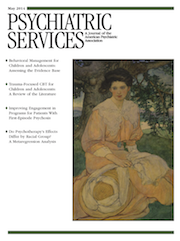Schizophrenia Treatment Satisfaction in Nigeria
Traditionally, evaluations of health care quality have primarily used measurements based on physiologic and therapeutic outcomes. Increasing recognition of the need for patient-centered evaluative approaches to health care service has led to greater use of patient satisfaction surveys in program evaluation to give patients a voice in the audit process.
The use of satisfaction surveys in mental health care lags behind satisfaction surveys in other fields of medicine. However, a growing body of research has demonstrated that including patient perspectives in the evaluation of the delivery of care can add an important dimension to our performance improvement efforts.
In Nigeria, similar to other low-income countries, satisfaction surveys are rare. Mental health professionals and administrators place a low premium on the assessment of patient satisfaction as an important indicator of hospital performance and service delivery. The dearth of satisfaction surveys deprives patients of the opportunity to provide input about service delivery to enhance sensitivity to their needs. Further, for patients who will need long-term follow-up, low satisfaction with service delivery can have a significant impact on their participation in and compliance with treatment interventions, appointment schedules, and the overall outcome of their care. Patients undergoing long-term psychiatric care are a major group with schizophrenia, a group whose feelings about their services are rarely studied in poorer countries.
Between July and September of 2011, we conducted a cross-sectional random survey of patients with schizophrenia attending the outpatient clinic of the largest psychiatric institution in Lagos, the Federal Neuro-Psychiatric Hospital in Yaba. The survey was done with the 15-item Charleston Psychiatric Outpatient Satisfaction Scale. Informed consent was obtained from each participant; the Hospital Ethical Committee approved the study protocol. Over three months, we recruited 110 patients between ages 19 and 81. Patients graded their level of satisfaction on a 5-point E5 response format ranging from 1, poor, to 5, excellent. Thirteen of the items were scored, for a possible range of 13–65.
The mean±SD score for overall satisfaction was 40.17±7.00. The highest scores were recorded in areas assessing helpfulness of the services received (3.73±.99), helpfulness of the records clerks (3.69±1.07), matching of treatment plan to patient’s needs (3.67±1.16), overall quality of care (3.62±.88), and willingness to recommend the service (3.42±.77). All but two of the scores were rated ≥3. The lowest mean scores were recorded for the amount of time waiting to be seen (2.67±1.08) and the cost of services and medication (2.50±1.63).
We were delighted to find that the areas of highest endorsement were those that reflected staff-patient interactions and perceptions of the value and quality of the overall care provided. Domains in which employees could provide positive experiences without additional cost were perceived favorably. The areas of low satisfaction reflected patients’ dissatisfaction with cost and waiting time at the outpatient clinic, which are largely a result of the lack of resources available and the high patient-doctor ratio in Nigeria. Although these shortcomings are more difficult to change than other factors, knowing outpatients’ perceptions has spurred us to begin making inroads into addressing these issues.
For example, since the survey was completed, the hospital has increased the number of doctors in its employ, which has helped in reducing waiting times. Cheaper generics of various antipsychotics are now available, which has made the cost of medication more affordable. Other hospital units have followed our lead and embarked on conducting surveys of satisfaction among all categories of patients. The hospital’s patient advocacy service has undergone reorganization and now employs a consultant psychiatrist.
The ease of conducting satisfaction surveys and the important information that they can gather makes them an easy-to-use, inexpensive, accessible, and effective evaluative method in assessing the quality of mental health care delivery. In Nigeria, it has begun to provide health care administrators with a template for building a patient-centered mental health service.



